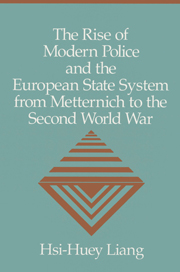Book contents
- Frontmatter
- Contents
- Abbreviations used in footnotes
- Preface
- Introduction: How do we define modern police?
- 1 Five national police styles in response to popular unrest in the nineteenth century
- 2 Modern police and the conduct of foreign policy. The French police and the recovery of France after 1871
- 3 International police collaboration from the 1870s to 1914 Professional contacts between police administrations
- 4 War and revolution, 1914–1922
- 5 The threat of totalitarianism. Nazi Germany's bid for European hegemony
- Epilogue
- List of archival files consulted
- Index
1 - Five national police styles in response to popular unrest in the nineteenth century
Published online by Cambridge University Press: 07 May 2010
- Frontmatter
- Contents
- Abbreviations used in footnotes
- Preface
- Introduction: How do we define modern police?
- 1 Five national police styles in response to popular unrest in the nineteenth century
- 2 Modern police and the conduct of foreign policy. The French police and the recovery of France after 1871
- 3 International police collaboration from the 1870s to 1914 Professional contacts between police administrations
- 4 War and revolution, 1914–1922
- 5 The threat of totalitarianism. Nazi Germany's bid for European hegemony
- Epilogue
- List of archival files consulted
- Index
Summary
The Austrian police: The Metternich system and its decline after 1848
General remarks
Austria's performance in the nineteenth century came closest to serving a perceived need for a European-wide police order. All the other countries followed their own national interest, especially after the revolutionary year 1848 when the Concert of Europe was replaced by an increasingly bellicose confrontation between the great powers. By contrast, the police control imposed by Metternich on the German Confederation after the murder of the Russian state councillor, August von Kotzebue, in 1819, was the forerunner of many more Austrian sponsored attempts at building bridges between the police authorities of the sovereign states of Europe.
With Austrian police at the height of its European influence in the immediate post-Napoleonic period, it is no wonder that Austrian police – like the police of France – to this day take pride in the length of its historical tradition, including its attainments under absolutist rule. The Hofpolizeistelle in Vienna, which kept the Habsburg rulers directly informed of daily police developments until 1848, dated back to the police ministry of Count Johann Anton von Pergen in 1793. Feudal titles like Hofrat for high police officials were continued into the republican era, as were (at least until the 1920s) the injunctions to the Austrian policeman to defend the good name of the monarchy and to give “obedience to his legitimate ruler.”
The Austrian police took pride in the number of police officials who held advanced law degrees and carried the designation Konzeptsbeamten. Perhaps the high level of education of its leading officials was meant to compensate for the fundamentally undemocratic disposition of Austrian police before 1945.
- Type
- Chapter
- Information
- The Rise of Modern Police and the European State System from Metternich to the Second World War , pp. 18 - 82Publisher: Cambridge University PressPrint publication year: 1992

